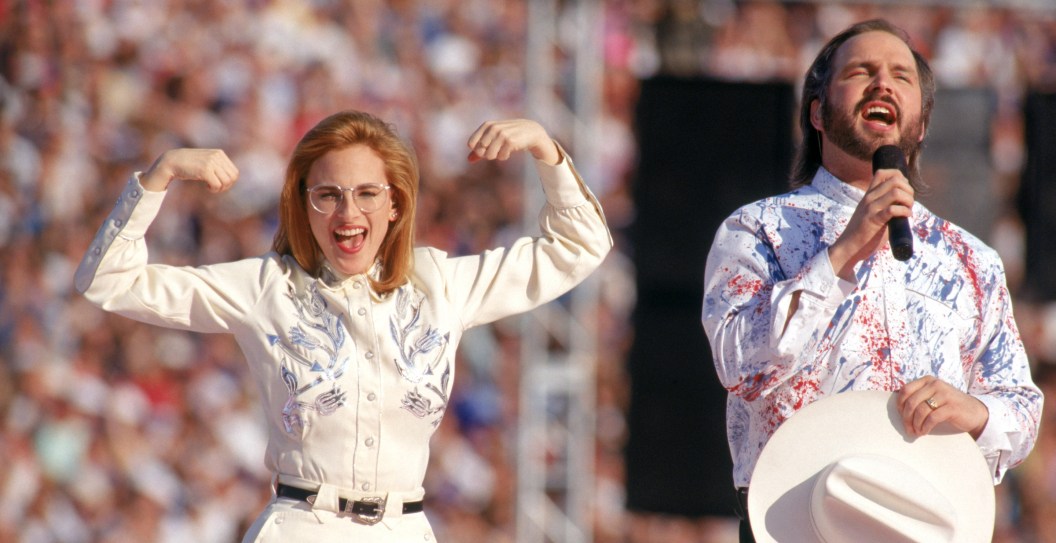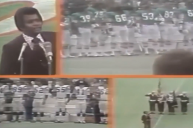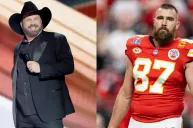Garth Brooks became the second country music star to perform during the big game's broadcast when he sang the national anthem at Super Bowl XXVII. Becoming the Buzz Aldrin to Charley Pride's Neil Armstrong (Pride sang the national anthem at Super Bowl VIII) isn't the headline nowadays, in part because Faith Hill, The Chicks, Kelly Clarkson, Carrie Underwood, Luke Bryan, Eric Church, Mickey Guyton and Chris Stapleton have since basked in the same global spotlight.
Beyond country artists at the Super Bowl becoming a more common occurrence since 1993, there's another reason why Brooks' appearance became the stuff of legend: he walked out on the job until NBC, the network with that year's broadcasting rights, agreed to air the controversial music video for "We Shall Be Free."
The LA riots following the Rodney King verdict inspired "We Shall Be Free" and its music video. Brooks happened to be in town then (April 1992) for the ACM Awards.
"During this whole time, I kept thinking about this Stephanie Davis song called 'Our Time Will Come' that we were working on," Brooks told the Los Angeles Times ahead of the Super Bowl. "For some reason, I just couldn't get the song out of my head. I called her the next day from the Grand Canyon and asked if she was aware of what was going on and she said, 'I'm already ahead of you. The song is now called 'We Shall Be Free.'"
Beyond commenting on recent headlines, Brooks' GLAAD (Gay & Lesbian Alliance Against Defamation) Media award-winning song raised eyebrows with the lines "we shall be free" "when we're free to love anyone we choose." Still, Brooks seemed confident that NBC and the NFL would be willing to incorporate his new music video into its broadcast.
"I've been called everything from Brutus to Judas because of that line, which was intentionally meant (to cover) everybody," Brooks told the Los Angeles Times. "I don't see how loving anybody can be a sin. I still feel strongly about that song and I'm glad the National Football League wants to use it as the theme for the Super Bowl game."
In other interviews, Brooks came across as fixated on nailing "The Star-Spangled Banner" live, not settling potential controversies surrounding "We Shall Be Free."
"I'm worried about my emotion," Brooks told the Associated Press. "I feel very strongly about the United States, about my country. This is a very high honor for me. I'm worried about halfway through the song I'll can out, become a vegetable. The one thing you cannot do is sing when you are gasping for air."
The network initially decided on game day against showing a music video filled with graphic footage from flag burnings, riots and natural disasters. Even celebrity cameos in the video, including one by the player who'd become that evening's MVP, Dallas Cowboys quarterback Troy Aikman, didn't balance out NBC's concerns. In response, Brooks reportedly left Rose Bowl Stadium in Pasadena, Cal. 45 minutes before kickoff.
Though the network was prepared to move forward with replacement singer Jon Bon Jovi, a deal was reached with Brooks, whose national anthem performance and music video airing pushed back the start time of the Dallas Cowboys' triumph over the Buffalo Bills— and the history-altering Super Bowl halftime show starring Michael Jackson.
The NFL now requires its national anthem performers to pre-record their singing.
As for the ongoing halftime show trend that began the same evening as Brooks' act of defiance, The Star Tribune (Minneapolis) reported in Feb. 1994 that Brooks got invited to follow in Jackson's moonwalk steps at the following year's Super Bowl. Brooks' elaborate plan involving "3,000 backup singers with glow-in-the-dark robes and a 14-piece stage that would come together to form a peace symbol" got nixed by Super Bowl officials for budgetary reasons. Brooks bowed out, freeing one of the world's grandest stages for fellow country stars Clint Black, Travis Tritt, Tanya Tucker and The Judds.
Country singers have sang the national anthem at every Super Bowl since 2021. Eric Church began the trend alongside Jazmine Sullivan. The next two years, Mickey Guyton (2022) and Chris Stapleton (2023) handed the honors. Ahead of 2024's kickoff, Reba McEntire will sing the national anthem on one of pop culture's top global stages.
McEntire's been practicing ahead of her big gig to an audience of one: her boyfriend and "coach," Rex Linn.
"I've been singing the national anthem in the shower [and] when we get in the car," McEntire told Apple Music. "He'll say, 'Okay, sing it one more time.' I said, 'I think I know the words real good right now, so I'm alright.'"
McEntire's singing "The Star-Spangled Banner" at the Super Bowl 50 years after a performance of the song at a rodeo in Oklahoma City led to her big break as a country singer.
Editor's Note; This story last ran on Feb. 9, 2022.




